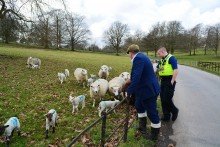It’s three years since the last National Rural Crime Survey revealed the huge financial cost of crime to rural communities and issues of chronic under-reporting.
The National Rural Crime Network produced a series of recommendations and, in many areas, steps were taken to improve matters. So, now, the National Rural Crime Network wants to know what’s changed.
Do you think rural crime has gone up or down in Dorset? Do you feel safer? What’s your view of the police in your community?
The survey questions cover a range of issues – from whether you report crimes that you or your business suffer from, to the impact crime and anti-social behaviour has on you and your area, and whether you believe enough is done to target those who carry out the offences.
The survey is now available at www.nationalruralcrimenetwork.net and is open for submissions until Sunday 10 June.
Martyn Underhill, Police & Crime Commissioner for Dorset, said: “I hope that anyone living or working in a rural community will spare a few minutes to complete our survey. It will provide a clear picture of what has improved, what challenges remain and what more government, police forces and organisations can do.”
The survey last took place in 2015. Then, 13,000 responded to give their impressions of crime and anti-social behaviour and revealed the financial cost of rural crime nationally was significant – around £800m every year.
One of this year’s focuses as we rerun the research is whether rural crime continues to be underreported. Three years ago, one in four said they didn’t report the last crime they’d been a victim of because they didn’t see the point.
The National Rural Crime Network, the organisation carrying out the new research, brings together Police & Crime Commissioners, police forces and organisations that play a key role in rural communities – like the Country Land and Business Association, the National Farmers Union, Neighbourhood Watch, Crimestoppers, Historic England and the Countryside Alliance.
After the 2015 report, police forces across England and Wales made efforts to improve the way they dealt with crime that took place in rural areas. A mix of measures were adopted, with Dorset being among the 13 forces who now have dedicated rural crime teams as a result of a 100 day pledge made by PCC Martyn Underhill upon his re-election. The 2018 Survey will assess the impact these changes have had in an attempt to further showcase and roll-out best practice.
The results will also feed into the National Police Chiefs’ Council’s Rural Affairs National Strategy for 2018-2021 which is due to be launched later this year.







